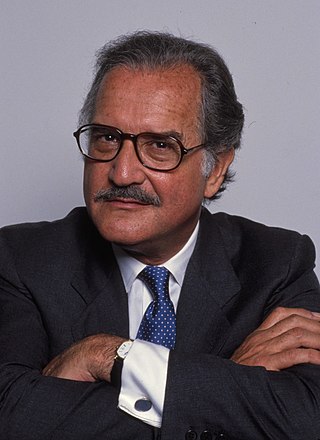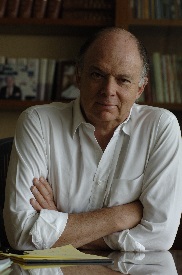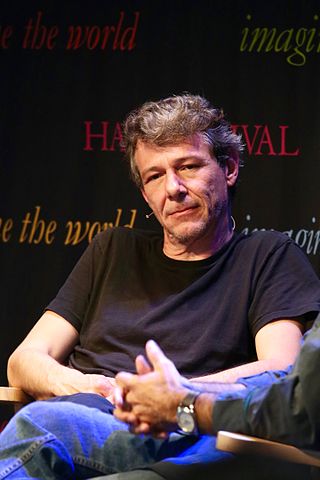Related Research Articles

Octavio Paz Lozano was a Mexican poet and diplomat. For his body of work, he was awarded the 1977 Jerusalem Prize, the 1981 Miguel de Cervantes Prize, the 1982 Neustadt International Prize for Literature, and the 1990 Nobel Prize in Literature.

Carlos Fuentes Macías was a Mexican novelist and essayist. Among his works are The Death of Artemio Cruz (1962), Aura (1962), Terra Nostra (1975), The Old Gringo (1985) and Christopher Unborn (1987). In his obituary, The New York Times described Fuentes as "one of the most admired writers in the Spanish-speaking world" and an important influence on the Latin American Boom, the "explosion of Latin American literature in the 1960s and '70s", while The Guardian called him "Mexico's most celebrated novelist". His many literary honors include the Miguel de Cervantes Prize as well as Mexico's highest award, the Belisario Domínguez Medal of Honor (1999). He was often named as a likely candidate for the Nobel Prize in Literature, though he never won.

Mexican literature stands as one of the most prolific and influential within Spanish-language literary traditions, alongside those of Spain and Argentina. This rich and diverse tradition spans centuries, encompassing a wide array of genres, themes, and voices that reflect the complexities of Mexican society and culture. From ancient indigenous myths to contemporary urban narratives, Mexican literature serves as a poignant reflection of the nation's essence, inviting readers to explore its rich history, diverse culture, and collective aspirations.
Augusto Monterroso Bonilla was a Honduran writer who adopted Guatemalan nationality, known for the ironical and humorous style of his short stories. He is considered an important figure in the Latin American "Boom" generation, and received several awards, including the Prince of Asturias Award in Literature (2000), Miguel Ángel Asturias National Prize in Literature (1997), and Juan Rulfo Award (1996).

Enrique Krauze Kleinbort is a Mexican historian, essayist, editor, and entrepreneur. He has written more than twenty books, some of which are: Mexico: Biography of Power, Redeemers, and El pueblo soy yo. He has also produced more than 500 television programs and documentaries about Mexico's history. His biographical, historical works, and his political and literary essays, which have reached a broad audience, have made him famous.
Alejandro Rossi was born in Florence, Italy of Venezuelan mother and Italian father) was an Italian-Venezuelan writer.

Latin American literature consists of the oral and written literature of Latin America in several languages, particularly in Spanish, Portuguese, and the indigenous languages of the Americas. It rose to particular prominence globally during the second half of the 20th century, largely due to the international success of the style known as magical realism. As such, the region's literature is often associated solely with this style, with the 20th century literary movement known as Latin American Boom, and with its most famous exponent, Gabriel García Márquez. Latin American literature has a rich and complex tradition of literary production that dates back many centuries.
Fondo de Cultura Económica is a Spanish language, non-profit publishing group, partly funded by the Mexican government. It is based in Mexico but it has subsidiaries throughout the Spanish-speaking world.
Guillermo Humberto Sheridan Prieto is a Mexican literary critic, scholar and public commentator.
The Grupo Cine Liberación was an Argentine film movement that took place during the end of the 1960s. It was founded by Fernando Solanas, Octavio Getino and Gerardo Vallejo. The idea of the group was to give rise to historical, testimonial and film-act cinema, to contribute to the debate and offer an open space for dialogue and freedom of expression that was illegal at that time. With strong anti-imperialist ideas, he harshly criticized Peronism and neocolonialism. In the subsequent years other films directors revolved around the active core of the Cine Liberación group.
The Alfonso Reyes International Prize is a Mexican award given for meritorious lifetime contributions to literary research and criticism. It was founded in 1972 by the economist turned author/critic, Francisco Zendejas and was named in honor of Alfonso Reyes, a well-known Mexican literary critic, author and poet.

Letras Libres is a Spanish-language monthly literary magazine published in Mexico and Spain.

Álvaro Enrigue is a Mexican novelist, short-story writer, and essayist. Enrigue is the author of six novels, three books of short stories, and one book of essays.
Infrarealism is a poetic movement founded in Mexico City in 1975 by a group of twenty young poets, including Roberto Bolaño, Mario Santiago Papasquiaro, José Vicente Anaya, Rubén Medina, José Rosas Ribeyro, Guadalupe Ochoa, Vera and Mara Larrosa, Claudia Kerik and José Peguero.

Enrico Mario Santí is a Cuban-American writer, poet, and scholar of Spanish American Literature known for his critical essays and annotated editions of Latin American classics, including works by Octavio Paz, Pablo Neruda, and Guillermo Cabrera Infante. A frequent political commentator and art critic, he is also a sculptor and voice actor. As a child, Santí emigrated from Cuba to the United States, where he has had an extensive career as a professor in several universities. Currently, he is a research professor at Claremont Graduate University, in Claremont, California.

Tedi López Mills is a Mexican poet born in 1959 in Mexico City. She studied philosophy at the National Autonomous University of Mexico for the first three years of her Bachelor's and finished at Sorbonne University in Paris. She later completed postgraduate studies at the Sorbonne in Latin American literature. She is among the contemporary Mexican writers that propose a turn toward the aesthetic of Mexican colloquial language.

The 1990 Nobel Prize in Literature was awarded to the Mexican poet and essayist Octavio Paz (1914–1998) "for impassioned writing with wide horizons, characterized by sensuous intelligence and humanistic integrity." He is the only recipient of the Nobel Prize in Literature from Mexico.
References
- ↑ Claire Brewster (2005). Responding to Crisis in Contemporary Mexico: The Political Writings of Paz, Fuentes, Monsivais, and Poniatowska. University of Arizona Press. p. 5. ISBN 978-0-8165-2491-4.
- ↑ Daniel Balderston; Mike Gonzalez; Ana M. Lopez (11 September 2002). Encyclopaedia of Contemporary Latin American and Caribbean Cultures. Routledge. p. 1576. ISBN 978-1-134-78852-1.
- ↑ Marjorie Miller (17 May 2012). "Appreciating Mexican author Carlos Fuentes". Google News. Associated Press. Retrieved 18 May 2012.[ dead link ]
- 1 2 Reed Johnson; Ken Ellingwood (16 May 2012). "Carlos Fuentes dies at 83; Mexican novelist". Los Angeles Times. Archived from the original on 17 May 2012. Retrieved 17 May 2012.
- ↑ "Mexico mourns death of Carlos Fuentes". The Telegraph. 15 May 2012. Retrieved 18 May 2012.
- ↑ Marcela Valdes (16 May 2012). "Carlos Fuentes, Mexican novelist, dies at 83". The Washington Post. Retrieved 16 May 2012.